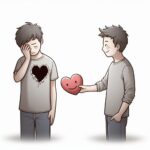覆水盆に返らずとは?
「覆水盆に返らず(ふくすいぼんにかえらず)」は、一度起きてしまったことや失われたものは、元には戻らないという意味のことわざです。特に、人間関係や人生の出来事において、過去の過ちや失敗は元に戻すことができないことを戒めるために使われます。
このことわざの由来
「覆水盆に返らず」の起源は、中国の古代故事にあります。春秋時代の名将、呂尚(りょしょう)(またの名を太公望といいます)が、あるとき、妻と離別してしまいました。しかし後に、妻が彼のもとに戻りたいと願い出ます。そのとき、呂尚は「一度盆からこぼれた水は、元に戻らない」と言って、離縁した過去を元には戻せないことを示しました。この故事がもとになり、「覆水盆に返らず」ということわざが生まれたのです。
このエピソードは、失敗や過ちは過去のものであり、いくら後悔しても取り戻せないこと、また一度壊れた関係や物事は元に戻せないことを教訓としています。
この表現の使われ方
「覆水盆に返らず」は、次のような場面で使われます。
過去の過ちを取り戻せないことを伝える場合
取り返しのつかないミスや、後悔してもどうにもならない出来事について述べる際に使われます。たとえば、誰かが重大な失敗をして悔いている時に、「もう覆水盆に返らずだから、次に進むしかないよ」と励ましの言葉として使うことがあります。
壊れた人間関係を戻せないことを伝える場合
特に人間関係や友人、家族、恋人との別れなど、関係が修復不可能になった場合に使われることが多いです。例えば、別れた恋人との復縁を望む人に対して、「覆水盆に返らずだよ」と、過去にこだわらず新たな道に進むことを勧める場合があります。
未来に向けて反省を促す際の教訓として
「覆水盆に返らず」は、過去の過ちを嘆くだけでなく、その経験を未来に活かし、同じ失敗を繰り返さないことが重要であることを伝えるためにも使われます。たとえば、大切なことを失った経験を持つ人に対し、同じ失敗を繰り返さないようにと諭す場面でも用いられます。
類似表現
「後悔先に立たず」:後悔しても過去は取り戻せないことを意味し、覆水盆に返らずと近い意味合いです。
「元の鞘に納まらない」:壊れた関係が元には戻らないという意味で、人間関係に特化した表現です。
「覆水盆に返らず」は、過去の過ちや失敗は戻せないという現実を受け入れ、未来に向けて新しい道を歩むことの大切さを教えてくれることわざです。人は過去を変えることはできませんが、この教訓を心に留めることで、過去の経験を今後の生き方に活かし、より良い選択をしていくことが求められます。この言葉は、過去にこだわらず、未来に目を向ける重要性を示しています。
Fusui-bon ni kaerenai” is a proverb meaning that once something has happened or been lost, it cannot be undone. It is used to remind us that past mistakes and failures cannot be undone, especially in relationships and life events.
Origin of this proverb
The origin of the saying “Kabusui-bon ni kiru” comes from an ancient Chinese legend. A famous general in the Spring and Autumn period, Lu Shang (also known as Taigong Wang), left his wife one day. Later, however, his wife asked to return to him. At that time, Lu Shang said, “Once water spills from a tray, it cannot be restored,” indicating that the past cannot be restored after a separation. Based on this legend, the saying, “Overspilled water never returns to the tray,” was born.This episode teaches the lesson that mistakes and failures are in the past and cannot be undone no matter how much we regret them, and that once a relationship or thing is broken, it cannot be undone.
How this expression is used
Kosui-bon-no kawaii” is used in the following situations.To convey that past mistakes cannot be undone:
It is used to describe a mistake that cannot be undone, or an event that cannot be undone even if one regrets it. For example, when someone is regretting a serious mistake, “It’s not going to happen again, so you’ll just have to move on,” may be used to encourage someone to move on.When communicating that broken relationships cannot be restored:
It is often used when a relationship has become irreparable, especially a breakup with a relationship, friend, family member, or lover. For example, it may be used to encourage a person who wishes to get back together with a former lover to move on to a new path without dwelling on the past, saying, “Kabusui-bon-no-return ni nai ka” (It is not possible to return to the past).As a lesson in encouraging reflection on the future:
Kabusuibon ni kirunai” is used not only to lament past mistakes, but also to convey the importance of applying the experience to the future and not repeating the same mistakes. For example, it can be used to tell someone who has lost something important not to repeat the same mistake.Similar expressions
Regret before regret” means that regret will not bring back the past.
The phrase “the original sheath won’t hold” means that a broken relationship cannot be undone, and is specific to human relationships.Conclusion
Kabusuibon ni kiranai” is a proverb that teaches us the importance of accepting the reality that past mistakes and failures cannot be undone, and to take a new path toward the future. One cannot change the past, but by keeping this lesson in mind, we must apply our past experiences to our future way of life and make better choices. This saying demonstrates the importance of not dwelling on the past, but looking to the future.
AIが描いた「覆水盆に返らず」






















コメント